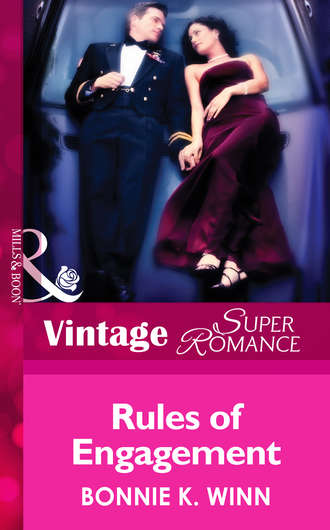
Полная версия
Rules of Engagement
NOW THAT HIS TEAM was searching for the designs, Cole felt marginally better. But they had to show up soon or the bid to Landry Industries would be closed. He’d begun work on the bid when Landry was still debating the new lines, before they’d secured their financing. Now that Landry had gone public, they had deep wells of cash. And Cole wanted some of it to bail out Harrington.
He glanced at the mariner clock. But the hands hung uselessly ever since he’d slammed the desk the day before. He regretted the impulse. His employees had given it to him as a gift to celebrate their first year in business. He wasn’t a particularly sentimental man, but he viewed the clock as a good luck token. He’d get it fixed. No sense pissing off the Fates.
He logged on to the network computer. His e-mail in-box was already full. Hopefully some of it was good news.
Dan stuck his head in Cole’s open door. “Do you know where Mark is?”
“Haven’t seen him this morning.”
The finance officer frowned and, obviously in a hurry, ducked back out and was on his way before Cole could question him.
The bank of phones that connected reception to the line supervisors in the plant were ringing incessantly. Then the outside lines started ringing as well.
“Marcia?” Cole called for the receptionist as he strode down the corridor. Couldn’t anyone be bothered to answer the damn phones?
The reception area was empty except for a woman he didn’t recognize, and the phone lines buzzed out of control. This wasn’t like Marcia. Ignoring the visitor, he walked behind the counter, and took over the switchboard.
“Can I help you?” he asked, once there was a pause in the phone calls.
“Actually, I—”
The phone rang again. “Just a minute.”
She pulled a card from her purse and laid it on the counter.
Finally, the board quieted. “Sorry about that. The receptionist is supposed to have been here by now.”
As he stood, Marcia rushed in, frazzled-looking. “I’m sorry. My car wouldn’t start.” She glanced at Tess. “I hope you haven’t been waiting long.”
“No. Just got here.”
“I called the auto club, but it always takes forever. I’m lucky to have such an understanding boss.” Marcia glanced at Tess. “Did Mr. Harrington take care of you?”
When she heard his name, Tess stood and addressed him. “Actually, I want to talk to you.”
Just what he needed. But the woman had been waiting patiently. He gestured to a chair in the reception area.
“I’d prefer to speak with you in private.”
He didn’t really have time for this, but he shrugged and quickly escorted her down the long hall into his office. He pointed to a pair of comfortable leather chairs.
“I’m afraid you have the advantage,” he began. “I don’t know who you are.”
“Tess Spencer.”
“And you’re with…?”
“I work in my family’s business. But that’s not why I’m here. Well, in a roundabout way it is.” She paused. “I’m just making my explanation more confusing.” She held up a laptop computer, then placed it on the table that separated them. “I’m here because of this computer.”
He barely glanced at it. He didn’t need to hear another sales pitch. “Our office manager takes care of all our purchasing needs.” He reached for the phone. “I can call her, pass along your—”
“You misunderstand. This laptop… It belongs to Cole Harrington.”
He tensed, his amiable smile disappearing. He picked up the computer, recognizing the distinctive gouges. “The one with my schematics,” he muttered beneath his breath. “How did you get it? Who are you with? Alton?”
“No. Last night, I went to an auction. I bid on a lot and this computer was in it.”
“You’re telling me you bought my computer at an auction?”
“I hope this isn’t difficult for you,” she said gently.
“Difficult?”
“I don’t know… I mean…did Cole survive the war?”
He cleared his throat. “Live and in person.”
“So you’re…”
“Cole. What makes you think I didn’t survive? And how did you know I was in the war?”
“I opened your letters.”
“You read my letters?”
“Well, I didn’t mean to—”
“Reading isn’t an involuntary response.”
Tess turned to face him directly. “No, but—”
“Okay. How much do you want for the computer?”
“Money?”
“Yes. Why else would you be here? You know my designs are on the hard drive.”
Shocked, Tess stared at him. “I thought if you hadn’t survived, your family would want these letters in case you hadn’t gotten to a land line to send them. I would’ve wanted my brother’s. But I’m sorry if reading them was an invasion of your privacy. And I’m sorry you thought I’d sell them to the highest bidder.” Not waiting for his reply, she left his office. She marched down the hall and through the reception area.
Back in her Lexus, she ignored the shrill response of her SUV as she put it in gear and sped out of the parking lot.
Jerk! She should have kept the damn computer. And here she thought she’d read the letters of the last sensitive man on the planet.
“MARCIA!” COLE BARKED into the intercom an hour later.
“I’m not deaf,” she reminded him.
“Did that woman leave a card?”
“I’m guessing your meeting didn’t go well?”
“The card?”
“I’ll be right there.”
He continued to pore over the computer until Marcia appeared a few minutes later, waving the card at him. “Tess Spencer of the Spencers Restaurants.”
The well-known name registered with him as he took the card.
“Was she here to see if we want to participate in one of their fund-raisers? They’re always for really good causes.”
Cole didn’t bother telling her that Tess’s intentions were his business. Marcia had cheerfully meddled since her first day at Harrington Engineering. And because she was wise and kind, not to mention old enough to be his mother, he accepted her small intrusions.
“Not about fund-raisers.”
Marcia frowned. “Wasn’t there something in the papers about their family a while ago?”
He hadn’t been back in the country long enough to catch up on the news, local or national. “Marcia, check with the auction house and see what we’ve sent over in the past few weeks.”
“Sure, boss.”
Cole continued combing through the directories of the notebook computer he’d used to write letters to the families of his slain and wounded men.
Even though tactical headquarters housed government-issue computers, he, like a lot of officers, had packed a small PC when he was deployed. Rotations were longer than they used to be and this had sometimes been his only connection to home. And when his unit was able to link up with a land line, he’d let his men use it for e-mail.
The letters all seemed to be there. But the designs were gone. Wiped so clean they weren’t recoverable. He knew how to look for their prints. But they’d been thoroughly, professionally erased.
So what did Tess Spencer and Alton Tool have to do with each other?
After a quick knock, Marcia popped inside his office. “Here’s a copy of the only manifest this month from the auction house.”
Scanning the items, he saw that a notebook computer wasn’t listed. Of course not.
Marcia held out another paper.
“What’s this?”
“While I was on the Web I looked up the Spencers in the Chronicle archives.” Her graying eyebrows wriggled with just enough intent to let him know she wouldn’t leave the subject alone.
He started to skim the page. But as the content registered, he slowed down, absorbing the details of the article. It reported the death of Tess’s brother. Sobered, he read about David’s background, his contributions to the community, his close relationship to his family, especially his twin sister.
How had this woman who’d lost a brother in Iraq come to own his computer?
“TESS, IS THAT YOU, HONEY?” Her mother’s voice reached to the restaurant foyer.
“Yes, Mom. I picked up the mail.” She caught up to her mother in the kitchen.
Judith Spencer hugged her, enveloping Tess in the comforting smells of cooking, along with her trademark Chanel cologne. Still attractive at sixty-two, Judith’s dark hair was streaked with far more gray than it had been only months before. The lines in her face had also deepened, but it was her eyes that betrayed her pain. Eyes that changed from gray to green or blue depending on what she wore or the colors around her. Tess had inherited her unusual eyes.
And much of her intuition as well.
Judith stroked Tess’s long dark hair. “What’s wrong?”
Tess shook off her annoyance. “Just more traffic than I expected.”
Judith studied her a moment longer, but she didn’t press. There’d been so much discussion since David’s death they often felt talked out. “It’s quiet here this morning.”
“Dad?”
“He should be here soon. He’s at the linen company, straightening out the order.”
“I told you I’d do that,” Tess protested. The linen supplier was under new management and they’d fouled up the orders for all three locations.
“He needs to keep busy,” Judith explained. “You’re back and forth between here and Dav—your restaurant so much I don’t know when you sleep.”
“At night,” she replied with a smile. “Something not only smells good, it smells different. Are you experimenting?”
“I just got some young peas, picked yesterday. I want a sauce that isn’t too heavy, but that’ll enhance their sweetness.”
“You’ll create something wonderful, you always do. Although Peter is the chef if you run short on time.”
“Or energy, you mean. Tess, don’t worry about us so much. We’re not fragile seniors.”
“As though you could ever be considered senior!”
Judith laughed. “When you turned twenty-one I couldn’t imagine how I’d aged that much. Now, if I could just turn the clock back to then…”
Tess bit her lower lip. If only they could. “I know you’re not fragile, Mom. You and Dad have been incredibly strong.”
Judith took her hand. “It runs in the family.”
Tess felt a rush of appreciation for her parents. They’d been running the landmark Spencers for years now, scarcely slowing down following David’s death. In the past she’d always believed they were invincible. “Then let me be strong now.”
“I don’t think I can stop you. Want to taste the sauce?”
Tess grinned. “Absolutely. Are you going to share the recipe or is it a landmark speciality?”
“I think you can twist my arm. Let me just check on the seafood delivery.”
Tess pinched a fresh croissant from a tray on the stainless steel counter, then sat on a stool, dangling her feet as she had when she was a child waiting for one of her parents. She supposed she could get to be eighty and still feel that way in the downtown Spencers. It was the original restaurant in the family business, established by Tess’s great-grandparents in 1920.
Back then, being right in the heart of the booming petroleum capital, it had appealed to the newly rich oil barons who claimed it as their own.
By the 1940s it was a hub for celebrities in all fields. The Second World War only enhanced its reputation when the three Spencer brothers went to war and only one, Tess’s grandfather, returned. Heroes, Tess thought bitterly.
Continuing the legacy, Tess’s grandfather had opened two additional locations, one in the prestigious Galleria area and one in nearby Galveston.
Patrons spoke of the original restaurant’s unmatched ambiance. Beyond the shimmer of formal china, well-polished silver and flawless linen, Spencers retained its classic Deco style. There was a solidity and elegance to the cherrywood walls and leather seating that only time could produce. Decades.
Tess and David had been groomed in the business since they were able to stand on a stool and reach the kitchen counter. She could remember coming in before opening time as a child, the familiar smells of the restaurant itself—lemon wax, and a mysterious blend of wonderful sauces from the kitchen.
She and David had been taught early on to respect the furnishings, the employees and the patrons—not necessarily in that order. They’d also been taught to love the business, to depend on its history.
But now she wasn’t so sure what to count on. So much had changed…
More than she’d been able to accept.
CHAPTER THREE
COLE TOOK THE TICKET from the parking valet and left his car keys. He studied the restaurant’s two-story entrance. This, the second Spencers, was located in the trendy Galleria area that catered to Houston’s well-heeled elite. Cole had never cared about being seen in the best spots, but many of the patrons probably did.
Also upscale and elegant, this Spencers had its own unique look. Smart, he thought. The locations didn’t compete with one another. It was easy to see why the Spencers were so successful. But their connection to his missing designs baffled him.
“Will you be dining with us tonight, sir?” The attractive hostess was dressed in a white blouse and black skirt.
“I’d like to speak to Tess Spencer.”
The hostess didn’t allow a flicker of reaction in her expression. “May I tell her who’s calling?”
“Cole Harrington.”
“Thank you, sir. Would you care to have a seat while you wait?”
He nodded, then walked down the wide, marble steps that led to the bar. Choosing a table, he barely sat down before a waiter took his drink order. Nearly as quickly, his dark German ale arrived.
“Mr. Harrington?” Tess’s voice was polite, but there was a barely detectable edge.
He stood. “Won’t you join me?”
She hesitated and Cole sensed it was courtesy alone that made her sit. “What can I do for you?”
“Listen.” He made himself smile, knowing anger wouldn’t get him the answers he needed. “To my apology, that is. I was rude and I’m sorry.”
Her eyes actually seemed to change color as they softened. “I see.”
He watched her closely. “It was kind of you to bring the laptop to my office. Most people wouldn’t have bothered.”
“No problem.”
He hadn’t seen her make any gesture, however a waiter arrived with a drink for her, then disappeared silently.
Cole lifted his glass. “To people doing the right thing.”
“And all they’re supposed to believe in,” she replied, the light in her eyes fading.
He held his glass midair. “Did I say something wrong?”
“No. It’s me, completely. I’ve been…off for a while now.”
“I read about your brother. Is that what you’re referring to?”
“Yes.”
Her brother had given his life in service. As curious as he was about his missing designs, Cole repeated words he’d had to say far more than he wanted to. “I’m sorry for your loss.”
“Me, too.” She fiddled with her glass. “Sometimes it still doesn’t seem real.”
“I know.”
“I’m sure you do.”
He studied her pale skin. Her grief was the one thing he didn’t doubt. “Was David regular Army?”
Tess shook her head. “Reserves. Service is sort of a family tradition. My grandfather was the only Spencer son to survive World War II. My father served for three years. David wanted to devote his time to the family business, but he wanted to do his duty, too, so he joined the Reserves. How about you?”
“Reserves. I joined because they paid for my education.” As he spoke, he saw that she was studying him closely.
“But you stayed.”
“For a lot of reasons.”
Tess hesitated. “Are you glad you did?”
“Yes.”
Her expression shifted. “Oh.”
Unexpectedly, Cole felt the same way he did when he was writing home to the families of soldiers he’d lost. “Refocusing your grief into work can help. And it looks like you’re doing a good job here.”
“Just managing what David had already put in place.”
“Then I imagine he’d be proud of you.”
Her lips tightened. “He should’ve had so much more. He was too young to die.”
Of course he was. “He gave his life for a noble cause.”
“Did he?”
Cole wasn’t shocked. Grief had no rules, no set parameters. “Even Solomon couldn’t answer that to everyone’s satisfaction.”
She knotted a linen napkin in a jerky motion. “Maybe. Maybe not. Our dinner rush is about to begin and there’s so much I’d like to talk to you about…David, I mean.”
He needed to talk to her as well.
“Why don’t we meet after dinner?”
Her large eyes cleared marginally. “I usually stop in at the landmark Spencers when I leave…but I could let that go tonight.” She pulled a business card from the small pocket of her suit, then scribbled on the back of it. “How about eleven? At my town house? Not as distracting.”
“I’ll be there.”
“Good. Now I’m afraid I have to get back to work.”
Cole nodded. “Later then.”
He watched her walk away, determined to get the answers she’d hidden under that meticulously polished exterior.
TESS HADN’T ENTERTAINED in her town house for months. Luckily her wine rack was well stocked. And she’d raided the restaurant for some decent nibbles, now arranged on the coffee table. Growing up in a restaurant meant there was always good food on the table whether it was a holiday or watching a game on television.
But the small town house itself wasn’t so easily fixed. Between her hours at work and those she’d devoted to Families of the Fallen, her compact home had become a place only to shower and sleep, a repository for clothes and not much else. And it showed. The cleaning service still came once a week so the place was spotless, but it lacked a homey warmth.
Maybe it had been a mistake to invite Cole Harrington here. But she had so many questions. There was so much she wanted to know. And she had no place else to go for answers. David’s unit was still deployed and although the officers at the base were polite, they didn’t have much time for her.
The doorbell rang and Tess ran nervous hands over the trim lines of her skirt. Belatedly it occurred to her that she should have taken time to change into something casual. The dogs barked frantically as she opened the door.
“Hi.” She leaned down, chastising her pets. “Hector! Molly! Enough.”
Undeterred, the small dogs pawed Cole’s knees, but he didn’t look annoyed. He knelt to accommodate their short stature and held out his hands. Sniffing him, they apparently approved as they quit barking.
“Sorry about that,” she apologized. “They get carried away with strangers.”
“Just being dogs.”
He sounded unconcerned and she relaxed considerably. “Thanks for coming.”
“I needed the break.”
“Were you still working?”
“The work doesn’t stop because the clock says it should.”
She gestured to the sofa. “Is merlot all right? I know it’s not trendy anymore, but my wine choices don’t follow fads.”
“Sounds good.”
He wandered over to her window, glancing around the room as she poured the wine.
She gestured toward the tray of food. “I snagged some food from the restaurant.”
He picked up an artichoke puff. “Looks better than the hamburger I had for dinner.”
She groaned. “I feel the guilt of four generations. I shouldn’t have let you leave the restaurant without insisting on dinner.”
“Hamburgers aren’t lethal.”
Tess sipped her wine. “I’m sorry I read your letters.”
“I guess that was because of your brother.”
“Yes,” she admitted.
She dug a bare toe into the hand-knotted silk rug that covered the oak floor. “I was touched by the way you wrote about the Iraqis.”
He shrugged. “They’re real.”
“And how you wrote about the men under your command.”
“Also real.”
She swallowed. “Especially the ones you lost.” She met his eyes, reacting to their startling shade of blue. She wanted to get past this small talk, to tell him that she felt as if she knew him, really knew him. That she wanted to talk with that man, the one she was sure would understand about David.
“It’s all right.”
“All right?”
“To ask what you want.”
What to ask first? She couldn’t decide. So she talked about David, about who he’d been, what had mattered to him. Then she had to know. “Were you scared?”
“Only a fool thinks he’s invincible.”
“And you’re not foolish.” She cleared her throat. “Does it bother you to talk about this?”
“It depends. Some people want to be armchair quarterbacks—telling me how it should have been done. Some people want gruesome details. It’s bad enough I lived through that part once. I don’t need an instant replay. But you want to know how it was for David. That’s different.”
“I hate to think about him being scared or alone.”
Cole’s smile was rueful. “In the Army you’re never alone.”
“David’s letters never told me how it really was over there. It didn’t occur to me when I read them that he was still being the older brother.”
“I thought you were twins.”
“He was born first, never let me forget it.” She smiled at the memory. “I wish he hadn’t felt the need to be so protective.”
“If you’re worried that he didn’t have anyone to talk to, don’t. That’s what battle buddies are for.”
“But you wrote letters that went below the surface.”
“Most of them were to my dad. He served in Vietnam. I could share things with him I couldn’t with other people.”
“It’s lucky you took the laptop.”
He paused for a long time. “Yeah. Lucky.” She wondered what he was leaving unsaid.
“Is that something many officers do?”
“Pretty much.”
“I keep thinking what a waste it was. All of it. David and the others who died. They had so much to give…now they’re just…gone. He never married, didn’t have any children. He would’ve been such a good father.” She couldn’t hide the entreaty in her voice. “Didn’t you feel that when you lost one of your soldiers?”
“I thought a lot of things. Sure, about their families they’d left behind. But, no, I don’t consider their heroism a waste.”
“When David was deployed, I was a little scared for him, but mostly proud. I believed in what he did, in how important our country and values are, how we have to keep that safe. I could recite the World War II heroics of my grandfather and his brothers by rote. And I’m not discounting what they did at that time. It mattered. Then it mattered. It was a different world back then. I don’t think there’s anything to idealize about this war.”
“What do you say to the people who thank us for their freedom?”
“What do they have to say to me? To my family?”
“Every time I lost someone under my command I struggled with what to tell his family, to let them know the sacrifice counted.”
“Your letters were kind…insightful,” she admitted. “But how do you rationalize the incredible loss of life? Especially young people who haven’t really had time to know better? Eighteen, nineteen years old? They aren’t even old enough to declare a major in college but they have to decide whether they’re giving up their lives? No. It’s not right! Not for a manufactured war.”
“What we did…what David did…it mattered.”
Tess could scarcely see beyond her fury. “When you ask young men and women to lay down their lives, they deserve to know the real reason they’re doing it.”
“The reality isn’t sound bites on the news or the supposedly in-depth reports either. It’s seeing the crushing grief, the need for hope and knowing you’re it—the only hope. And when you lose one of your own people, you mourn the life that could have been. And then you go on soldiering.”
Tess wanted to call him an impostor. The man who’d written the letters she’d read couldn’t believe it was all right. He just couldn’t.
CHAPTER FOUR
COLE WALKED DOWN the long curved driveway, past the patio to the big three-car garage. As he’d known he’d be, his father was surrounded by motorcycle parts and tools. Since Cole’s childhood, John Harrington had carried on a passionate love affair with Harley Davidson. Each restoration had led to another. Old and new, he loved them all. With the sole exception of his family, they were his only loves.










